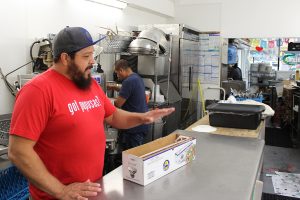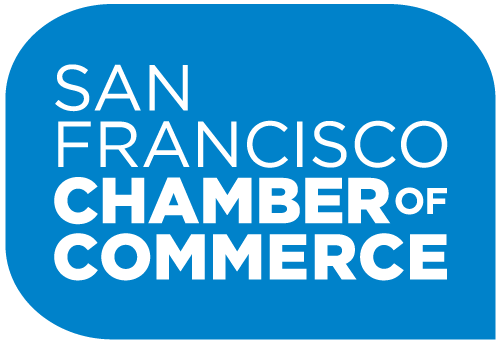
Luis and Zenaida Estrada came to San Francisco from El Salvador in search of better opportunities, including the chance to start their own business. After taking MEDA’s Core Business Training startup course with his wife Zenaida in late 2011, they realized that their dream might be possible. Over the last 5 years, they have expanded from catering into two food trucks and now a restaurant in the iconic Casa Sanchez space on 24th Street. Read more in our Minority-Owned Small Business Partner Spotlight powered by First Republic Bank with Luis and Zenaida.
 Why did you want to start a small catering business in San Francisco?
Why did you want to start a small catering business in San Francisco?
Luis Estrada: When my wife and I moved here from El Salvador, I began as an employee working in restaurants, doing regular jobs. We really started from zero, because when you arrive in a country and nobody knows you, you have to start from scratch. I worked my way up to executive chef at the Legion of Honor Museum, but while I was there I got the opportunity to be a father. I wanted to focus on our family, so I stopped work and started looking for different jobs where we could spend more time as a family.
Once my son was born, I wanted to get back into the restaurant industry, but I wanted to help small catering businesses or restaurants with creating new ideas and concepts for their menus. My wife saw this, and after a while she said it was time for us to do our own. I had helped so many people grow their business and make it successful, it was time to start our own.
How did you come up with the business plan for D’Maize?
LE: First thing we did was we knocked on MEDA’s door. It’s funny, because when you live and work for most of your life in the Mission District, there can still be tools and resources that you never knew about. So my wife went to a course about creating a business plan, and we met Edwin [Rodriguez, our business coach], and he worked with us through the entire business planning program.
 Zenaida Estrada: When I first met Edwin, I was thinking about starting a daycare. But when we started on the business plan, the idea for this catering business came to mind, and I knew if Luis and I worked together, we would have more possibilities for success.
Zenaida Estrada: When I first met Edwin, I was thinking about starting a daycare. But when we started on the business plan, the idea for this catering business came to mind, and I knew if Luis and I worked together, we would have more possibilities for success.
What makes D’Maize stand out from other Latin restaurants?
LE: We wanted to promote our culture and food in a healthier, more modern style and show the people in our community a different way to cook our food. Some of our customers that work at tech companies spend eight hours of their day sitting at desks, and we didn’t want them to remember us because our food was too heavy; we wanted them to remember us because the food was delicious. That’s the reason we promote a healthier way to cook.
Why was it important to keep D’Maize in the Mission District?
ZE: When I walk through this neighborhood, I feel comfortable. This is our home. We love walking around and talking with all of the people. If we need ingredients, we can find it right here. My son goes to school very close tothe restaurant. Everything for our family has been in the Mission District.
 LE: The Mission District has changed a lot; now, it’s a more multicultural place, and it’s a great opportunity for us as Latinos to introduce new people to our food. We don’t need to go anywhere else to reach those new people. And it helps that all of the businesses and organizations in the Mission are working together now; they all band together for the community, and I feel like we are stronger.
LE: The Mission District has changed a lot; now, it’s a more multicultural place, and it’s a great opportunity for us as Latinos to introduce new people to our food. We don’t need to go anywhere else to reach those new people. And it helps that all of the businesses and organizations in the Mission are working together now; they all band together for the community, and I feel like we are stronger.
What were some of the challenges in renovating the old Casa Sanchez place for D’Maize’s restaurant?
LE: This place was basically destroyed; it hadn’t been operational for seven years, so again, we were starting from zero. MEDA gratefully approved us for a loan to remodel the space, and one morning at 2 a.m. I got the vision for how we should set up the restaurant. We opened the walls and expanded the kitchen. I don’t know how they operated before with such a small kitchen !We also took out the booths on the patio for more dining tables.
ZE: The patio is amazing; we kept it colorful with the murals so when people come here to eat, they feel it’s an authentic Latino place.
LE: We also had to put flashing lights in the window, because people who have been living here forever would walk by and didn’t realize the place was even open.
What has made D’Maize so successful?
Edwin Rodriguez: Originally, they were planning to sell international food, but instead they listened to what their clients wanted and decided on their native food.
ZE: At the beginning, we thought we were going to make Italian or Peruvian food, or very high-end cuisine. But when people realized we were from El Salvador, they asked us to make our own food, and we listened. It was also easier because we grew up with this kind of food.
ER: Second, they focused on identifying the target market and clients. With such a large Latino community here, it’s very common to hear proposals for a taqueria or similar places. In this case, they were exploring a new market beyond traditional Latino clients, and that’s how they were able to market as a catering service to bigger businesses and tech companies.
 LE: It was so important to us to reach out to MEDA and other partners. The time and tools they provided were crucial, but if you don’t take the time and think about what you want to do, success is not guaranteed. Whatever you want to do, you have to be the best at it and find the right tools. If you have a dream, you have to chase it.
LE: It was so important to us to reach out to MEDA and other partners. The time and tools they provided were crucial, but if you don’t take the time and think about what you want to do, success is not guaranteed. Whatever you want to do, you have to be the best at it and find the right tools. If you have a dream, you have to chase it.
Where do you see D’Maize in another five years?
LE: It’s funny, because we were a part of La Cocina’s kitchen incubator program where they offered to help us grow as a commercial user. The program was supposed to last five years; but after two years, they said we were growing too much and we had to go on our own! We felt nervous because it’s a big challenge and it showed how things can change so quickly. But we feel blessed and grateful because we started as a small catering company seven years ago and have grown that into a restaurant and two food trucks. Right now, we are focused on growing our current projects, and I am focused on continuing to learn as much as I can. My mom taught me that; she was a single mom, and she gave me and my sister everything. I never heard her say no. And that was how I learned that I need to always do the best I can.
How do small businesses benefit from partnerships with the San Francisco Chamber of Commerce and First Republic Bank?
LE: When you have the tools like those from the SF Chamber, you have to take advantage of that, and approach everything with all of the tools you have at your hands. This is the way you decide if you want to be a successful business, or just a business.
ER: This is one of those cases that also reflect how important it is in the non-profit world to work in partnerships. If you put together all of the resources, not just expertise in the food, and take advantage of everything in your community, you will be successful.
About the Minority-Owned Small Business Partner Spotlight … Powered by First Republic Bank
The San Francisco Chamber of Commerce and First Republic Bank have partnered up to highlight the extraordinary work of minority-owned small businesses in San Francisco. Each quarter, the partnership will spotlight a business and showcase the unique product or service that business is providing to strengthen the fabric of the San Francisco community. The spotlight recipient, nominated by a nonprofit partner, will also be provided with an Influencer Level ($5,000 value) membership for the San Francisco Chamber of Commerce, powered by First Republic Bank. Over the years, First Republic’s focus on exceptional, relationship-based service and its client-centered culture has led to long-term relationships with its clients. First Republic is proud to support nonprofit organizations within its communities, particularly those focused on affordable housing, the arts, economic development, and financial education for underserved populations.
